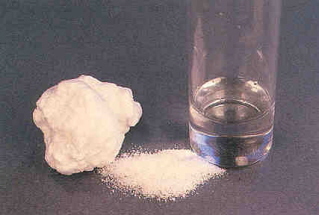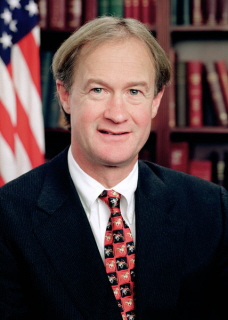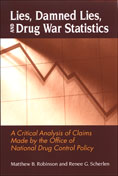Numbers and analysis on both sides of the ocean show the drug war to be a failure based on the weakest of assumptions.
It's kind of ironic when a Germ gets busted for soap, but Don Bolles isn't laughing after a bad field drug test said his Dr. Bronner's Magic Soap contained GHB. Neither is Dr. Bronner's.
As Britain's 10-year drug strategy comes up for renewal or replacement next year, the latest in a long line of reports assailing it has come out.
E-mails and phone calls are urgently needed to certain US senators to help repeal a bad law at the juncture of drug policy and education.
An important new book debunks literally years of statistical legerdemain by the nation's central drug policy office -- and is DRCNet's latest premium for our members.
The judge presiding over the retrial of Northern Virginia pain specialist Dr. William Hurwitz has thrown out the most serious charges.
Tensions are rising in Peru's Upper Huallaga Valley coca fields, as government eradicators come under attack, growers go on strike, and the GarcÃa government vows to take a hard line.
Former US Senator Lincoln Chafee spoke out on the need for changes in drug policy at the SSDP Northeast Regional Conference last weekend.
A bill that would significantly expand the so far modest reforms of New York's draconian Rockefeller drug laws has passed the state Assembly.
With a big push from reform organizations, the Maryland legislature has passed a measure that will help more than 1,000 drug offenders have a chance to get out early.
Vindictive federal prosecutors are determined to go after Ed Rosenthal, even though they can't send him to prison and the judge told them not to.
Last week, the Middlebury, Vermont, town council blindsided the Emporium Tobacco and Gift Shop with a sudden order to cease and desist from selling salvia divinorum. Now, the shop owner is fighting back.
The British Medical Association Junior Members Forum has called for cannabis-based medicines to be prescribed by the National Health Service.
The underground radio Drug Truth Network is now doing video, using the popular service YouTube.
Vermont DA, Cannabinoid Chonicles, Arianna Huffington, Emperor of Hemp trailer, LSD chemical warfare experiments, Kirsten Dunst, Dow Jones on medical marijuana research, Tony Papa on John Valverde case, Ethan Nadelmann on NPR, GOOD magazine, Patients Out of Time on YouTube
Events and quotes of note from this week's drug policy events of years past.
Support the cause by featuring automatically-updating Drug War Chronicle and other DRCNet content links on your web site!
A new way for you to receive DRCNet articles -- Drug War Chronicle and more -- is now available.
Visit our new web site each day to see a running countdown to the events coming up the soonest, and more.
When discussing the idea of drug legalization with those who are unfamiliar with the issue, I am commonly asked, "Wouldn't more people use drugs if they were legal?" or "Wouldn't all the problems increase if drugs were legal?"

David Borden
The reaction is a simplistic one. It's possible -- not a given -- that drug use will increase after prohibition is ended. But that's the bare beginning of the analysis, not the conclusion of it. Whatever happens to drug use rates, the many devastating harms rising from prohibition will end -- the violence and public disorder of the illegal drug trade, the poisonings and the overdoses from uncertain purity, the desperate straits of addicts who can't afford high street prices, just to name a few. Richard Dennis, a famed financial trader who was an early major supporter of this movement, wrote that addiction rates could double with legalization but the total harm still decrease. I don't know what the math is or if there is any good math on the subject. But even if we knew what would happen with drug use rates or drug addiction rates -- which we don't -- to make that the only measure of the policy, much less the primary one, does not do justice to the complexity or the importance of drug policy.
My prediction is that experimental or casual use of certain drugs would increase, but would mostly involve lower potency forms of the drugs than are widely available now, and would be counter-balanced by decreased use of other currently legal drugs like alcohol (the "substitution" effect). But that's just a guess, albeit an educated one.
Brian Bennett, publisher of the "truth: the Anti-drugwar" web site, featuring extensive compilations and charting of drug war data, pointed out in an e-mail this morning that in 1979, the year when drug use is said to have peaked, there were 7,101 recorded deaths from all illegal drugs combined. In 2004, the latest year for which data is available (and for which Bennett just uploaded a presentation), the total was up to 30,711, more than four times as many. Clearly, there's a lot more to things than mere usage rates.
The stinging report of the UK Drug Policy Commission released this week provides some insight, even if tentative, to the question of whether huge numbers of people would become drug users who are not users now if drugs were legalized. According to the report, which was coauthored by a prominent American academic, Peter Reuter, and a prominent British academic, Alex Stevens, "There is little evidence from the UK, or any other country, that drug policy influences either the number of drug users or the share of users who are dependent." Other factors -- cultural and social, the report cites -- appear to play a more important determining role than laws and policies.
Reuter and Stevens presumably had analyzed the differences only between different prohibitionist systems, since there are no extant legalization systems with which to compare the data. To switch to a legalization system is a more fundamental change than to switch between one prohibition system and another, even between a harsher one like ours and a more tolerant one such as the policies in the Netherlands or Switzerland. Still, at a minimum such a finding calls into question the assumption that drug use would skyrocket following legalization -- it's just not obvious at all that that would happen.
Reuter and Stevens also point out that governments can make a difference in "reducing the levels of drug-related harms⦠through the expansion of and innovation in treatment and harm reduction services." That is to say, drug-related deaths need not have more than quadrupled in the US during a quarter-century in which the drug-using percentage of the population has decreased, if only policymakers would be a little more thoughtful about what they are doing. That last sentence is my interpretation; I don't want to put words in the authors' mouths. But I think it follows from their own words pretty straightforwardly.
It is understandable for a rank-and-file citizen who hasn't studied drug policy to not immediately show the same degree of sophistication in the issue as a scholar or advocate. After all, many of drug policy reform's basic tenets are counterintuitive -- it did not occur to me that drug legalization could reduce crime until I read about the idea, for example.
But for policymakers to continue to base policies that affect large numbers of people on the most simplistic reactions or slogans is downright irresponsible -- as Bennett's numbers prove. The consequence of ignorance or politicization in drug policy is suffering, injustice and death. Shame on our "leaders" who have willfully allowed it happen.
back to top
Don Bolles, drummer for the legendary punk band the Germs, was going to an Alcoholics Anonymous meeting with his girlfriend, 21-year-old Cat Scandal, after picking her up for "a day off" from drug rehab, on April 4, when they were pulled over in a traffic stop by Newport Beach Police. During a search of the vehicle -- to which Bolles unwisely consented -- police found a bottle of peppermint Dr. Bronner's Magic Soap. According to a police field drug test, the soap contained GHB (gamma hydroxyl butyrate), a so-called date rape drug illegal under state and federal law.

GHB -- Don Bolles and Dr. Bronner's don't have it
Despite Bolles' disbelieving protests of innocence, he was arrested and charged with possession of GHB. The aging punk spent three and a half days in a series of Orange County jails before being bailed out, and another 10 days facing felony charges before a confirmation test done by the Orange County Sheriff's Department Crime Lab came back negative and prosecutors announced they were dropping the charges.
The field test was performed by a kit manufactured by Armor Forensics/ODV called the Narcopouch 928. Armor Forensics/ODV did not respond to calls from the Chronicle about the false positives reported by its product. One man at ODV who refused to identify himself said only that he could not comment because of possible legal action.
The Drug and Alcohol Testing Industry Association did not respond to Chronicle queries about accuracy standards within the industry. In the group's defense, however, it should be noted that they were all out of the office this week attending a national drug testing industry convention.
The Newport Beach Police Department did not respond to calls from the Chronicle about the accuracy of the GHB field test.
Bolles is out from under the long arm of the law now, but he's not happy about his experience. Neither is Dr. Bronner's Magic Soaps, whose president, David Bronner, is also a leading figure in the hemp movement and a friend of drug policy reform. Bronner offered Bolles legal assistance when he heard the news, and Dr. Bronner's began a public campaign to clear its name and put the drug testing industry on the defensive.

NarcoPouch Squad Pack Kit -- not an accurate test for GHB
Bolles couldn't believe he was being arrested for drug possession, he told the Chronicle. "I knew it wasn't GHB, I knew it was soap; I used it that morning," he said. "It was ridiculous."
Ridiculous it may have been, but Bolles' three and a half day journey through the jails of Southern California was no laughing matter. "They kept me in several different jails, and it was a pretty hardcore experience for me," he said. "There was some 28-hour, weird booking procedure; you have to sit around in a concrete cubicle with other prisoners, they wake you up every half hour. It was pretty horrifying."
When Dr. Bronner's heard about Bolles' predicament on April 9 it issued the first of a series of press releases decrying his arrest and flatly denying that its product contained GHB. "This clearly is a case of profiling by the Newport Beach police of a person who doesn't look like the people who live in that town," said vice-president Michael Bronner. "We are paying the cost of Mr. Bolles' lawyer, and we demand the charges be dropped or proof from the police forensics lab of GHB contamination be immediately provided to us," he stated.
David Bronner derided the police for their bizarre notion that soap was a good place to put GHB. "We cannot imagine anyone putting GHB, or any other drug for that matter, into a rinse-off soap product that is lathered and rinsed off the body immediately," he said. "The Newport Beach police should see how much of a buzz putting beer in their shampoo gives them, and get a grip and apologize on their hands and knees to Mr. Bolles."
"This is ridiculous," Bronner told the Chronicle. "Not only is drug testing an incredible intrusion into people's privacy -- countries like Canada and Europe don't allow this -- but this test is completely unreliable, causing false positives with things like soap. What kind of standards are these tests subject to before they are placed on the market?"

Dr. Bronner's Magic Soaps -- not a useful medium for consuming GHB
"The testing of substances for drugs is basically unregulated," Kevin Zeese, a prominent long-time drug reformer and political activist with expertise in the intersection of law and drug testing. "If it were the feds, the DEA would set the standards, but at the local level, it's state and local police who make the decisions. This all takes place within the criminal justice system; there is no regulation by the FDA or any other agency apart from law enforcement agencies," he told the Chronicle.
"There have been lots of cases of these sorts of tests not being accurate and causing problems, so this is not surprising," said Zeese. "Now, the local police are going to have to do something to correct their standards so they don't falsely accuse people. If they don't, this kind of thing ends up being regulated by the courts."
Bronner had another, disturbing question. "What else can cause a false positive, and how many people have been thrown in jail because of that?" he asked. "Don came under a whole lot of pressure to just plead. According to the drug testing company literature, you can get a conviction based on just a field test and a confession. The confirmation tests have lower cut-offs, so the cops try to get you to confess based on the field test."
Bronner's campaign isn't ending with Bolles' exoneration. At least four other soaps have resulted in false positives in the Narcopouch 928 GHB test kit, including Neutrogena and Tom's of Maine. "We are testing more products and videotaping those tests. Products from Johnson & Johnson and Palmolive are testing positive, so we'll go to the Cosmetics, Toiletries and Fragrances Association, show them these products are testing positive, and then work through them to explore options for addressing the situation with these field drug test kits. Ideally, we could force a product recall, but we need at least a disclaimer if this product is going to continue to be sold. If they don't know soap tests positive, what else don't they know?"
He is also calling for law enforcement to quit using the Narcopouch 928. "Police departments across the country should stop using that immediately," he said.
Bolles rose to fame in the late 1970s as a member of the LA punk band the Germs, whose influence was widespread in the scene and who are credited with popularizing the Mohawk haircut. The band broke up in 1980 after lead singer Darby Crash killed himself. The surviving members reunited two years ago and will tour this summer.
Bolles has not washed his hands of the case yet, either. "The lawyers and David and I have been consulting about our best legal strategy," he said. "We haven't decided which direction to go yet. But what happened to me shouldn't happen to anybody else."
back to top
With Britain's 10-year UK Drug Strategy up for renewal or replacement next year, a series of reports detailing its flaws have appeared in recent months. Now, we can add one more to the list. This week, a new independent panel on drug policy issued a report saying that a decade of Labor's drug war had failed to curb the social problems and criminality related to drug abuse under prohibition.

UK government: failing at drug policy
The report,
An Analysis of UK Drug Policy was authored by University of Maryland drug policy analyst Peter Reuter and Alex Stevens of the University of Kent, for the
UK Drug Policy Commission. Headed by long-time drug reform proponent Dame Ruth Runciman, the commission describes its mission as "to provide independent and objective analysis of drug policy and find ways to help the public and policy makers better understand the implications and options for future policy."
If the commission's report is any indicator, policy makers can use the help. Labor's strategy of education campaigns, forced drug treatment, some harm reduction measures, and harsher prison sentences has not made an appreciable dent in drug use. Britain has the highest level of dependent drug users in Europe, the report found, and heroin use has skyrocketed from 5,000 people in 1975 to an estimated 280,000 now.
The report estimated the size of the British drug market at more than $10 billion a year and the cost of drug-related crime at more than $25 billion a year. It also found that Britain's drug use rates were among the highest in Europe.
While Reuters and Stevens were highly skeptical of the ability of drug policy to influence drug use, they praised harm reduction measures. "Government policies have only limited impact on rates of drug use itself," they wrote. "However, the UK has introduced evidence-based measures, notably the expansion of treatment and harm reduction, that have reduced the harms that would otherwise have occurred. On the other hand it operates measures, such as classifying drugs to deter use and increasing use of imprisonment, that have little or no support from available research."
The number of people in drug treatment had increased from 85,000 to 181,000 between 1998 and 2005, much of that increase driven by the criminal justice system, the authors noted. But the number of drug war prisoners has also increased by 111% in the past decade, and sentences are nearly a third longer than when Tony Blair took office.
The report's executive analysis section on policy implications is worth quoting at length:
There is little evidence from the UK, or any other country, that drug policy influences either the number of drug users or the share of users who are dependent. There are numerous other cultural and social factors that appear to be more important. It is notable that two European countries that are often used as contrasting examples of tough or liberal drug policies, Sweden and the Netherlands, both have lower rates of overall and problematic drug use than the UK.
Given the international evidence as to the limited ability of drug policy to influence national trends in drug use and drug dependence, it is unreasonable to judge the performance of a country's drug policy by the levels of drug use in that country. Yet that is the indictor to which the media and public instinctively turn. However, this is not to say that drug policy is irrelevant.
The arena where government drug policy needs to focus further effort and where it can make an impact is in reducing the levels of drug-related harms (crime, death and disease and other associated problems) through the expansion of and innovation in treatment and harm reduction services.
We know very little about the effectiveness and impact of most enforcement efforts, whether they are directed at reducing the availability of drugs or at enforcing the law over possession and supply. Imprisoning drug offenders for relatively substantial periods does not appear to represent a cost effective response.
Transparency in resource allocations is urgently needed if the overall and relative balance of supply and demand reduction interventions is to be considered.
The UK invests remarkably little in independent evaluation of the impact of drug policies, especially enforcement. This needs redressing if policy makers are to be able to identify and introduce effective measures in the future.
Unsurprisingly, the Blair government rejected the report's findings. "The British Crime Survey shows that drug use has fallen by 16% since 1998 and drug use among adults has fallen by 21%," a Home Office statement said. "We are determined to build on this progress by continuing to take more drugs off our streets, put more dealers behind bars and make sure young people are informed about the harms drugs cause," he said.
Equally unsurprisingly, the opposition Tories called the report "a shocking indictment" of Blair's drug policy. "After ten years in power this is a shocking indictment of the government's failure and shows that Tony Blair has utterly failed in his pledge to get tough on the 'causes' of crime," said Tory Shadow Home Secretary David Davis in a press release. "The consequences of this failure are not just that hundreds of thousands of young lives are being ruined -- drugs also fuel much of the gun and knife related violence on our streets today, thus destroying communities."
But the Tories would only offer more of the same, the press release indicated. "Conservatives would take real action to combat this scourge on society. Not only would we increase the amount of residential drug rehab beds and increase the prison capacity so that offenders can settle and complete their drug rehab courses, we would also establish a dedicated UK border police to stop drugs simply flowing in through our porous borders. This force would also act to detect and prosecute those who smuggle drugs into our country."
Danny Kushlick, director of Transform Drug Policy Foundation, which advocates legalization, had a different solution. "We know from evidence that misuse of drugs is related significantly to social ill-being and social deprivation," he told the Guardian. "You cannot deal with that stuff with education and prevention or through teaching younger and younger children. You deal with it by redistributing wealth and improving wellbeing."
Britain has seen report after report detailing the failures of prohibitionist drug policy in the last two years. Next year, it will have the opportunity to put the lessons learned into practice. When was the last time we had such an overview of drug policy in the United States?
back to top
Earlier this week, DRCNet issued action alerts to our subscribers from 21 different states that are represented on the US Senate's Health, Education, Labor and Pensions (HELP) Committee, asking for phone calls to be made and e-mails sent in support of including full repeal of the Higher Education Act's (HEA) drug provision in the pending Senate HEA reauthorization bill. Special thanks to the hundreds of you who responded to this call to action -- we have reason to believe it has made a difference!
If you are from one of the applicable states, and have not yet e-mailed your senator who is a member of HELP, please visit http://www.RaiseYourVoice.com/senate to speak up (or http://www.RaiseYourVoice.com to learn more about the issue). Those states are: Alaska, Colorado, Connecticut, Georgia, Illinois, Iowa, Kansas, Maryland, Massachusetts, New Hampshire, New Mexico, New York, North Carolina, Ohio, Oklahoma, Rhode Island, Tennessee, Utah, Vermont, Washington and Wyoming.
Also, please call your senator's office to register your opinion that way too -- a phone call usually makes more of an impact than an e-mail -- and drop us an e-mail at [email protected] to let us know. Visit http://www.RaiseYourVoice.com/senate for talking points and further information to help with your call. The senator's phone numbers are as follows:
Alaska: Senator Lisa Murkowki, (202) 224-4654
Colorado: Senator Wayne Allard, (202) 224-5941
Connecticut: Senator Christopher Dodd, (202) 224-2823
Georgia: Senator Johnny Isakson, (202) 224-3643
Illinois: Senator Barack Obama, (202) 224-2854
Iowa: Senator Tom Harkin, (202) 224-3254
Kansas: Senator Pat Roberts, (202) 224-4774
Maryland: Senator Barbara Mikulski, (202) 224-4654
Massachusetts: Senator Ted Kennedy, (202) 224-4543
New Hampshire: Senator Judd Gregg, (202) 224-3324
New Mexico: Senator Jeff Bingaman, (202) 224-5521
New York: Senator Hillary Rodham Clinton, (202) 224-4451
North Carolina: Senator Richard Burr, (202) 224-3154
Ohio: Senator Sherrod Brown, (202) 224-2315
Oklahoma: Senator Tom Coburn, (202) 224-5754
Rhode Island: Senator Jack Reed, (202) 224-4642
Tennessee: Senator Lamar Alexander, (202) 224-4944
Utah: Senator Orrin Hatch, (202) 224-5251
Vermont: Senator Bernard Sanders, (202) 224-5141
Washington: Senator Patty Murray, (202) 224-2621
Wyoming: Senator Michael Enzi, (202) 224-3424
Thank you for taking action. DRCNet has been fighting against this law since it was passed in 1998, and with your help we could actually win it now!

Ten members of Congress spoke at the press conference we organized for the Coalition for Higher Education Act Reform in 2002.
back to top
Normally when we publish a book review in our
Drug War Chronicle newsletter, it gets readers but is not among the top stories visited on the site. Recently we saw a big exception to that rule when more than 2,700 of you read our review of the new book Lies, Damned Lies, and Drug War Statistics: A Critical Analysis of Claims Made by the Office of National Drug Control Policy. Much of this reading took place during a week that had other very popular articles as well, so clearly the topic of this book, which was authored by respected academics Matthew Robinson and Renee Scherlen, has struck a chord. As well it should.
Please help DRCNet continue our own work of debunking drug war lies with a generous donation. If your donation is $32 or more, we'll send you a complimentary copy of Robinson and Scherlen's book to help you be able to debunk drug war lies too.
Over the coming weeks I will be blogging on our web site about things I've learned reading Lies, Damn Lies, and Drug War Statistics. Stay tuned!
Your donation will help DRCNet as we advance what we think is an incredible two-year plan to substantially advance drug policy reform and the cause of ending prohibition globally and in the US. Please make a generous donation today to help the cause! I know you will feel the money was well spent after you see what DRCNet has in store. Our online donation form lets you donate by credit card, by PayPal, or to print out a form to send with your check or money order by mail. Please note that contributions to the Drug Reform Coordination Network, our lobbying entity, are not tax-deductible. Tax-deductible donations can be made to DRCNet Foundation, our educational wing. (Choosing a gift like Lies, Damn Lies, and Drug War Statistics will reduce the portion of your donation that you can deduct by the retail cost of the item.) Both groups receive member mail at: DRCNet, P.O. Box 18402, Washington, DC 20036.
Thank you for your support, and hope to hear from you soon.
Sincerely,

David Borden
Executive Director
P.S. You can read Chronicle editor Phil Smith's review of the book here.
back to top
The judge presiding over the retrial of prominent Northern Virginia pain specialist Dr. William Hurwitz has dismissed the most serious charges against him. On Wednesday, as the defense rested in the month-long retrial, Judge Leonie Brinkema granted a defense request to dismiss charges of causing bodily injury or death. Hurwitz still faces dozens of drug trafficking counts linked to his pain management medical practice.

Dr. Hurwitz in 1996
Hurwitz was originally convicted in November 2004 and sentenced to 25 years in prison. He has been there ever since, even though the original verdict was overturned on appeal. While he could still face substantial prison time if found guilty again, he will not face the 20-year mandatory minimum sentence that the charge of causing bodily injury or death carries.
In dismissing the charges, Brinkema agreed with two arguments advanced by the defense. First was that prosecutors had not proven the pain relievers prescribed by Hurwitz caused death or injury. Second was that the US Supreme Court in its decision upholding Oregon's right to die law last year ruled that federal drug laws did not give the Justice Department the power "to define general standards of medical practice."
That is precisely what federal prosecutors have done in dozens of cases like Hurwitz's. Prosecutors repeatedly -- and often successfully -- argued that doctors prescribing high dose of opioid pain relievers were outside the bounds of "accepted medical practice," and thus drug dealers, not doctors.
Now it will be more difficult for prosecutors to win a new conviction against Hurwitz. They must show that he knew the drugs he prescribed would be resold or abused and prescribed them anyway. Hurwitz has steadfastly denied that. Now prosecutors will have to prove that his problem patients were so obviously drug addicts and dealers that he had to have known his prescriptions were being diverted.
back to top
Tensions continue to rise in the coca fields of Peru's Upper Huallaga Valley, with a coca eradication team attacked over the weekend, a strike by growers bubbling up in Huánuco state, more tough talk from President Alan GarcÃa, and a Wednesday announcement by the Peruvian police that they had found the link between growers and the violent remnants of the Shining Path guerrilla movement.

coca waiting by the side of the road to go to market
The unrest comes just three weeks after a similar strike in Tocache province in San MartÃn state. That strike was settled by an agreement to halt forced eradication of coca crops, but the GarcÃa government ended that moratorium last week, with the president himself calling for the "bombing" of coca fields and maceration pits.
Last weekend, as eradication commenced again, a team of almost 200 civilian and police eradicators were ambushed in Yanajanca in the Tocache district, leaving one civilian eradicator dead and five police wounded. While the identity of the attackers remains unknown, police were quick to note that the area where the attack occurred is an area where a Shining Path remnant led by "Comrade Artemio" operates.
On Tuesday, coca farmers in Tingo MarÃa and Aucayacu went on strike, as did their comrades in Leoncio Prado province. Few reports were in by mid-week, but farmers had vowed to block highways. Among other things, they are asking for a meeting with a high-level government delegation.
But President GarcÃa Tuesday dismissed that call. "What delegation of high ranking officials?" he scoffed. "There is nothing to dialogue about because Peru needs to promote responsible agricultural development with alternative crop programs that will help put an end to drug production."
Drug traffickers are behind the strike, GarcÃa claimed. "It is evident that drug lords are orchestrating the strike. Just as in Colombia where drug lords have purchased the protection of para-military guerrilla groups to protect their illicit operations, they have done same with groups of coca farmers who run around protesting, 'let me grow whatever I feel like growing' and I am here to tell you that is not how it works," the Peruvian leader said.
By Wednesday, Peruvian authorities had switched from traffickers to the Shining Path as the culprits. In a loudly trumpeted (and conveniently timed) bust, Peruvian Police announced they had "finally placed the link" between restive coca farmers and the Shining Path. Police claimed two Shining Path members were arrested in Aucayacu as they awaited a meeting with coca farmer representatives. Police said they found weapons, ammunition, Shining Path propaganda, and detailed plans for blocking roads during protests.
Peru is the world's second largest producer of coca behind Colombia. Some 60,000 peasant families grow about 100 tons of the bushy plant, much more than is bought up by the state coca monopoly as a legitimate crop.
back to top
The drug war should be reevaluated in a global context, former US Senator Lincoln Chafee (R-RI) told attendees at the Students for Sensible Drug Policy (SSDP) Northeast Regional Conference last Friday night. The conference, which went through Sunday, was held at Brown University in Providence.

Lincoln Chafee
"We're at the point now where we really need to assess whether or not it's working," Chafee told the crowd of about 120. "There are a lot of people who will tell you it's not working. We should be open and honest with ourselves and what are our options."
Chafee, who was the sole Republican Senator to vote against the Iraq War and had a strong in-state approval rating, was nevertheless defeated for reelection by a Democratic challenger in last year's campaign. During his tenure in the Senate, Chafee served as chairman of both the Western Hemisphere and Middle East subcommittees, where he has become familiar with drug policy issues. During his 1999 Senate campaign, he admitted smoking marijuana as a college student.
The key to effective drug policy is to have a uniform global policy, he said (ignoring the fact that that is precisely what we have now). "The doors are open to a different way of looking at the war on drugs," he said. "It has to be done in unison, with a lot of other countries."
Chafee also called for the reassessment of federal laws governing mandatory sentencing during the forum. And he called for repeal of the Higher Education Act's anti-drug provision, which bars students with drug convictions from receiving financial aid for specified periods.
"[When someone is released from prison] the first thing they want to get is a skill and you get that by going to school," Chafee said. "To forbid them from getting school aid because they have a conviction is backwards. I'm sure those laws were put into place with good intentions, but we're at a point where we're saying let's try something different. When you hear politicians talk about the war on drugs, they always say they're doing it to protect the children."
Chafee's remarks were published in the Providence Journal, which also provided some well-deserved ink for the conference and SSDP. The newspaper even provided the address for the event.
It also quoted SSDP communications director Tom Angell encouraging young people to participate in politics. "It's important for young people to be involved in the movement since it impacts our generation," he said. "When you hear politicians talk about the war on drugs, they always say they're doing it to protect the children. This war is waged in our names."
Though Chafee stopped short of addressing the prohibition question, he did, in response to a question about former Uruguayan President Jorge Batlle's call for drug legalization, reveal that he was sitting opposite a podium from President Batlle at the December 2000 press event where Batlle made that comment. Chafee said that he was "stunned" by Batlle's remarks, but considered it "courageous" and that we need to "consider new ways of thinking."
back to top
The continuing effort to undo New York's draconian Rockefeller drug laws took another step forward Wednesday as the state Assembly passed a bill that would expand the availability of drug treatment and give judges greater discretion in sentencing. The push comes three years after the legislature enacted modest initial reforms, but since then only 177 of the state's 15,000 drug prisoners have won sentence reductions.
The new bill would:
- Increase judges' discretion and allow some people convicted of first- and second-time drug offenses to receive treatment and probation instead of prison terms.
- Set up drug courts in every county, to make efforts to get drug offenders into treatment programs.
- Raise the weight thresholds for certain drug offenses so that the possible sentence times are reduced.
- Create or expand "second chance" programs for low-level drug defendants, such as the Court Approved Drug Abuse Treatment program, in which offenders' cases can be dismissed or reduced to misdemeanors upon successful completion of treatment.
- Create enhanced penalties for violent drug dealers and people who sell drugs to children.
"The modest reform to the Rockefeller Drug Laws enacted in 2004 and the extension in 2005 to provide for the re-sentencing of some class A-II offenders was a beginning, but unfortunately, despite pledges made by then Gov. George Pataki and the Senate to make additional changes, no further action was taken. The Assembly's repeated passage of significant drug law reform legislation for years went unnoticed by the former executive and the other house," said Speaker Sheldon Silver as the vote neared.
"This bill provides reforms that are long overdue," he continued. "It would expand the availability of drug treatment programs, allow judges to order non-violent, lower-level offenders into mandatory treatment for addiction and substance abuse and assure that prisons are most often used for serious drug offenders, offenders with violent histories and those who cannot or will not succeed in drug abuse treatment. We are confident that with the help of Gov. Eliot Spitzer, the Assembly's long-standing commitment to make the state's drug laws smarter, fairer and more effective will become a reality," added Silver.
"The opposition will say we are soft on crime," said Jeffrion Aubrey (D-Queens) who chairs the Assembly Committee on Correction and who authored the bill. "But we understand the revolving door of criminal justice and we want to shut that door."
back to top
Some Maryland drug offenders will be serving less time under a bill that passed the state legislature before the session ended earlier this week. The measure, HB 992, would allow second-time nonviolent drug offenders sentenced under mandatory minimum sentences to seek parole. With just under 5,000 drug offenders in prison in Maryland, the result will be an unanticipated opportunity for early release for some.
Under current state law, second-time drug sales offenders face a mandatory minimum 10 years in prison. HB 992 will allow all but those also convicted of crimes of violence to seek parole.
According to a Justice Policy Institute (JPI) report on Maryland's mandatory minimums released in February as part of an effort to prod legislators to pass such a measure, more than 1,200 people have entered the Maryland prison system sentenced under mandatory minimum drug laws in the past 11 years. That same report found that in the last five years, 89% of the 500 sentenced under those laws were black.
The bill was backed by the Partnership for Treatment Not Incarceration, an alliance of organizations headed by JPI and the Drug Policy Alliance. DRCNet is a member, as are the Maryland Office of the Public Defender, Americans for Safe Access, Sensible Drug Policy Maryland, Law Enforcement Against Prohibition, the National Association of Criminal Defense Lawyers, Power Inside, Students for Sensible Drug Policy University of Maryland Chapter, Interfaith Drug Policy Initiative, and the Marijuana Policy Project.
back to top
Federal prosecutors in the Ed Rosenthal medical marijuana cultivation case announced last Friday they will retry the guru of ganja, even though they cannot send him to prison and even though the presiding judge urged them to drop the case and admonished them for vindictively prosecuting him. US District Court Judge Charles Breyer, who has overseen the case from the beginning, demanded that prosecutors tell him who in the Justice Department had authorized this new prosecution.

Ed Rosenthal at courthouse, with supporters, September 2006 (courtesy indybay.org)
Rosenthal was convicted in federal court in San Francisco in 2003 on marijuana cultivation charges after Breyer ruled he could not present evidence showing he was cultivating medicinal marijuana legally under California law and with the approval of local authorities. When jury members heard the rest of the story after they convicted him, they held a news conference to denounce their own verdict.
In the wake of the juror rebellion, Judge Breyer sentenced Rosenthal to one day in jail, which he had already served. While his original conviction was overturned because of juror misconduct, the 9th US Circuit Court of Appeals upheld the one-day sentence, which prosecutors had appealed.
But that same ruling affirmed the federal government's right to prosecute medical marijuana violators, and the prosecutors, led by US Attorney Scott Schools, apparently irked by Rosenthal's high profile criticisms of them, decided to retry him on the cultivation charges and throw in four counts of money laundering and five counts of filing a false federal income tax return as well. Breyer threw out the new charges last month, saying they were solely to punish Rosenthal for winning his appeal.
"This isn't a criminal case, this is a political case," Rosenthal told reporters as he arrived at the courthouse dressed in a blue wizard's robe with a golden marijuana leaf emblazoned over the breast. "I may as well get my money's worth and have a trial."
back to top
Last week, Drug War Chronicle reported on an escalating campaign to criminalize salvia divinorum, the fast- and short-acting hallucinogenic Mexican member of the mint family whose use has seeped into the popular consciousness among North American psychonauts in the past decade. The story opened with the town of Middlebury, Vermont, declaring a public health emergency to stop a local tobacconist from selling the potent herb.

salvia leaves (photo courtesy Erowid)
Now, the store owner is fighting back. The day our story ran, James Stone, proprietor of the Emporium Tobacco and Gift Shop,
announced he will appeal the order and has hired an attorney to fight it. "If they had come to me first, I would have worked with them," Stone said.
But that's not what happened. The town council acted on the matter without notifying Stone, who only learned of the ban when a reporter called him the next day. The council acted after Police Chief Tom Hanley reported that the town school resource officer had become aware that teenagers were using salvia. While Hanley could not name any cases where anyone had suffered any adverse effects from ingesting the drug, he urged the council not to take that chance. "It's a tragedy waiting to happen," he said.
Hanley also made the odd claim that the hallucinogenic effects of salvia, which last for less than 20 minutes, can be extended for several hours if the user is drinking alcohol. "You can't have kids with developing brains putting this stuff in their bodies," Hanley warned. "The effects are different for different individuals and you just don't know what's going to happen."
But the Middlebury ban is not just against sales to minors. It is a total ban.
Salvia has been a "substance of concern" for the DEA for several years, but remains legal under federal law. Five states and a handful of municipalities have criminalized it, and similar efforts are afoot in seven other states this year. But Middlebury is unique in having chosen the public health emergency route.
That's raising eyebrows among civil libertarians. "It sounds very arbitrary and very broad and very subjective," said Allen Gilbert, executive director of Vermont's chapter of the American Civil Liberties Union. "How does one person make the determination that something is a danger?" Gilbert said.
back to top
The British Medical Association's (BMA) Junior Members Forum voted Sunday in favor of marijuana-based medicines being prescribed by the National Health Service (NHS) to ease the suffering of patients. The group called on the BMA to lobby the British government to change the laws to allow research to develop treatments with cannabinoids, the active ingredients in the plant.
In the British medical system, junior doctors are those who have received a medical degree and are in postgraduate training. While the term seems to imply callow youth, junior doctors in Britain may in fact have logged years treating patients at the NHS.
The vote in Dundee, Scotland, came after the forum heard from Dr. Andrew Thomson, a Scottish General Practitioner and prominent member of the BMA, who told of a patient of his suffering terrible pain who he was unable to help with cannabis because of the state of the law. "A lot of our patients turn to using cannabis to try to relieve their pain -- let's not make them criminals," he said. "Let's not turn pain into punishment."
His patient, a professional woman who suffered from multiple sclerosis, knew of the evidence about cannabis relieving pain, but could not commit a criminal act, Thomson told the forum. "It was frustrating to see it but I could not encourage her to use it," he said. "I know what is best for my patient potentially but I am not allowed by the system to use what would relieve the suffering."
back to top
Houston drug reformer Dean Becker's Drug Truth Network is expanding its reach to encompass the popular video-posting and -viewing web site YouTube. The Drug Truth Network already gets its pro-reform message out via a web site, Internet radio, several dozen broadcast radio stations, and podcasts.
As of Tuesday, Drug Truth has a six-minute video on YouTube featuring Tommy Chong, among others. That video is designed to entice viewers to visit an hour-long video from a panel discussion including a federal High Intensity Drug Trafficking Area (HIDTA) member, Marcia Baker of Phoenix House, and Becker himself, representing Law Enforcement Against Prohibition.
Becker's Drug Truth Network also includes the Cultural Baggage radio program and the 4:20 Drug War News. Check 'em out!
back to top
interview with pro-legalization Vermont DA Robert Sand, by Ethan Nadelmann, podcast from DPA
April 2007 issue of Cannabinoid Chronicles
Arianna Huffington says that Democratic Candidates are Deafeningly Silent on the Drug War, Huffington Post
new trailer for Emperor of Hemp, Jeff Meyers documentary on Jack Herer
USA Today article on new book about the government's LSD chemical warfare experiments
Actress Kirsten Dunst praises value of moderate marijuana use, AOL Movie News
Dow Jones news on the growing evidence supporting medical marijuana.
former drug war prisoner Anthony Papa speaks out on another injustice, the case of John Valverde.
Making the Case for Legalizing Marijuana, Ethan Nadelmann on NPR
Siobhan O'Connor on Chains of Love, GOOD Magazine
Patients Out of Time YouTube site on cannabis therapeutics
back to top
April 25, 1894: The Indian Hemp Drug Commission concludes that cannabis has no addictive properties, some medical uses, and a number of positive emotional and social benefits.
April 23, 1998: The Ottawa Citizen reports that Canadians who tell US border officials the truth about their past use of marijuana will be denied entry to America indefinitely.
April 25, 2000: Despite the formal opposition of the Hawaiian Catholic Church, the Hawaii State Senate passes medical marijuana legislation, joining California, Oregon, Washington, Maine, Alaska, and Arizona in shielding medical marijuana patients from criminal prosecution.
April 20, 2001: American Christian missionary Veronica Bowers and her seven month-old daughter, Charity, are killed when their small plane is shot out of the sky by a Peruvian military jet as part of a CIA-backed program that patrols the Amazon Basin for drug couriers. The Senate Intelligence Committee investigates and concludes the missionary pilot did nothing wrong and should not have come under fire.
April 24, 2001: In Oklahoma, Will Foster, 42, a medical marijuana patient who in 1995 was sentenced to 93 years in prison for growing 39 marijuana plants in his basement, is released on parole. Foster used marijuana to relieve chronic pain caused by acute rheumatoid arthritis. "My medical use of marijuana never interfered with my work, I ran a successful business," said Foster. He added, "I was minding my own business taking care of my health and my family. What was I doing to anybody that got me 93 years?"
April 20, 2002: Robin Prosser of Missoula, Montana begins a hunger strike demanding access to government grown marijuana to help her treat symptoms of Lupus. Prosser says that marijuana helps combat the illness and relieves her pain and stress.
April 21, 2004: US Circuit Court Judge Jeremy Fogel bars the US Dept. of Justice from interfering with Mike and Valerie Corral, heads of a medical marijuana hospice near Santa Cruz, California, with their 250 patients, or with their marijuana garden. Judge Fogel cites Raich v. Ashcroft, a 2004 Ninth Circuit decision which found the federal government has no jurisdiction over patients who grow their own plants.
April 22, 2004: The Pacific edition of the magazine Stars and Stripes reports that twenty sailors assigned to Commander, Naval Forces Marianas (Guam) were arrested on drug-related charges since late 2003 alone.
back to top
Are you a fan of DRCNet, and do you have a web site you'd like to use to spread the word more forcefully than a single link to our site can achieve? We are pleased to announce that DRCNet content syndication feeds are now available. Whether your readers' interest is in-depth reporting as in Drug War Chronicle, the ongoing commentary in our blogs, or info on specific drug war subtopics, we are now able to provide customizable code for you to paste into appropriate spots on your blog or web site to run automatically updating links to DRCNet educational content.
For example, if you're a big fan of Drug War Chronicle and you think your readers would benefit from it, you can have the latest issue's headlines, or a portion of them, automatically show up and refresh when each new issue comes out.
If your site is devoted to marijuana policy, you can run our topical archive, featuring links to every item we post to our site about marijuana -- Chronicle articles, blog posts, event listings, outside news links, more. The same for harm reduction, asset forfeiture, drug trade violence, needle exchange programs, Canada, ballot initiatives, roughly a hundred different topics we are now tracking on an ongoing basis. (Visit the Chronicle main page, right-hand column, to see the complete current list.)
If you're especially into our new Speakeasy blog section, new content coming out every day dealing with all the issues, you can run links to those posts or to subsections of the Speakeasy.
Click here to view a sample of what is available -- please note that the length, the look and other details of how it will appear on your site can be customized to match your needs and preferences.
Please also note that we will be happy to make additional permutations of our content available to you upon request (though we cannot promise immediate fulfillment of such requests as the timing will in many cases depend on the availability of our web site designer). Visit our Site Map page to see what is currently available -- any RSS feed made available there is also available as a javascript feed for your web site (along with the Chronicle feed which is not showing up yet but which you can find on the feeds page linked above). Feel free to try out our automatic feed generator, online here.
Contact us for assistance or to let us know what you are running and where. And thank you in advance for your support.
back to top
RSS feeds are the wave of the future -- and DRCNet now offers them! The latest Drug War Chronicle issue is now available using RSS at http://stopthedrugwar.org/chronicle/feed online.
We have many other RSS feeds available as well, following about a hundred different drug policy subtopics that we began tracking since the relaunch of our web site this summer -- indexing not only Drug War Chronicle articles but also Speakeasy blog posts, event listings, outside news links and more -- and for our daily blog postings and the different subtracks of them. Visit our Site Map page to peruse the full set.
Thank you for tuning in to DRCNet and drug policy reform!
back to top
With the launch of our new web site, The Reformer's Calendar no longer appears as part of the Drug War Chronicle newsletter but is instead maintained as a section of our new web site:
- Visit http://stopthedrugwar.org each day and you'll see a listing of upcoming events in the page's righthand column with the number of days remaining until the next several events coming up and a link to more.
- Check our new online calendar section at to view all of them by month, week or a range of different views.
- We request and invite you to submit your event listings directly on our web site. Note that our new system allows you to post not only a short description as we currently do, but also the entire text of your announcement.
The Reformer's Calendar publishes events large and small of interest to drug policy reformers around the world. Whether it's a major international conference, a demonstration bringing together people from around the region or a forum at the local college, we want to know so we can let others know, too.
But we need your help to keep the calendar current, so please make sure to contact us and don't assume that we already know about the event or that we'll hear about it from someone else, because that doesn't always happen.
We look forward to apprising you of more new features on our web site as they become available.
back to top














